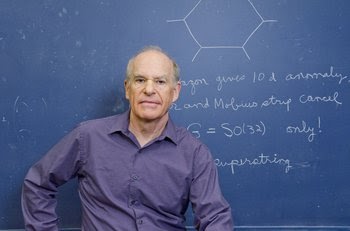

Body of IITR

John H. Schwarz is the Harold Brown Professor of Theoretical Physics in the Division of Physics, Mathematics, and Astronomy. Dr. Schwarz majored in mathematics at Harvard (BA, 1962) and then went to UC Berkeley for graduate work in theoretical physics. He is regarded as one of the founders of string theory. His work with Prof. Michael Green led to the so-called “first superstring revolution”. He has received various awards throughout his career. He received the Dirac Medal of the International Centre for Theoretical Physics in 1989. He shared the Fundamental Physics Prize with Michael Green “for opening new perspectives on quantum gravity and the unification of forces.” in 2013. On 17th October 2020, Prof. Schwarz was invited by the Institute Lecture Series Committee,IITR to deliver a webinar lecture as part of the “The Mysteries of Universe” lecture series . The topic of the lecture was “The birth and Development of Superstring Theory”. Watch Out! had the chance to inquire into his thoughts about theoretical physics and find out more about his journey through his years of research.
Watch Out!: What inspired you to pursue theoretical physics? At what age did you know that this was what you wanted to do?
Prof. John Schwarz: As an undergraduate I majored in math. However, during my junior year I decided to apply for graduate school in physics. I felt that describing the real world was a more exciting challenge that would utilize my math skills.
Watch Out!: Being one of the pioneers of string theory, what were your feelings every time you had a breakthrough, for example, superstring theory?
Prof. John Schwarz: Two examples particularly stand out in my memory. When Scherk and I realized in 1974 that string theories are quantum gravity theories that could also describe the other forces, I was very excited. At that point I was convinced (correctly, as it turned out) that I knew what I would be working on for the rest of my career. My collaboration with Michael Green culminated in a breakthrough in 1984 (the anomaly cancellation result) that was also very exciting.
Watch Out!: Both your parents are PhDs in different fields. Do you feel having parents from a scientific background gave you an edge as a researcher?
Prof. John Schwarz: My parents were very supportive, though they did not try to push me in any particular direction. Being raised in a family in which science was appreciated was certainly a big factor in making me the person I became. I feel very fortunate.
Watch Out!: In one of your interviews, you said, “discovery of supersymmetry would be more profound than life on Mars” why did you say this?
Prof. John Schwarz: Perhaps that was a silly thing to say. However, I do believe that the discovery of supersymmetry would have a revolutionary impact on particle physics – both theory and experiment.
Watch Out!: Is the string theory our only hope at present to lead to a unified theory?
Prof. John Schwarz: I am unaware of any promising alternatives, though there are people trying.
Watch Out!: What drives the scientific pursuit on a personal level for scientists? Is it curiosity and intellectual challenge, or does it include the urge to be remembered?
Prof. John Schwarz: I think it is almost always the former and that is the way it should be.
Watch Out!: If you weren’t a theoretical physicist, what do you think you would be doing?
Prof. John Schwarz: Probably mathematics.
Watch Out!: Science will surely outlast humankind, but what do you think would be the next ‘holy grail’ of science once we reach the ‘theory of everything’? And do you see it happening anytime soon?
Prof. John Schwarz: Even if superstring theory is the correct fundamental theory, we are very far from a complete understanding of our physical Universe. Some features are a matter of chance and others have deep explanations. It is not always clear which is which. In addition to accounting for particle physics, we also want to understand the origin and evolution of the Universe. This will require the guidance of our experimental and observational friends. I have no idea whether a complete understanding will ever be achieved. I don’t know what would come after that. Exobiology?
Watch Out!: You mentioned in your talk that after the development of QCD (Quantum Chromodynamics), a community of several hundred practitioners was reduced to a handful, which of course, included you. What made you stick with it in those times?
Prof. John Schwarz: Scherk and I felt that such a beautiful mathematical structure must be good for something. Once we thought in those terms, it was not hard to realize that it is a quantum theory of gravity. This happened within a year of the widespread acceptance of QCD. It took a decade to convince a significant part of the community that this was a promising direction to explore. The support of Gell-Mann helped to bolster my self-confidence during that period.
Watch Out!: In one of your talks in 2007, you stated that you did not consider gravity to be significant enough to incorporate in string theory till the mid-1970s. What made you propose the usage of string theory as the quantum theory of gravity?
Prof. John Schwarz: As I discussed, string theory was originally developed to describe the strong nuclear force. In those days gravity was not studied by particle physicists, so it was not really on our minds. We knew that it is incredibly weak, and completely negligible, at nuclear and atomic scales. So the shift in viewpoint did not come easily. The discovery of QCD actually helped to motivate the search for another use of string theory.